Education
Leading lights from education discuss the highs and lows of 2019 as well as the hopes for 2020
In the last month of the year, a note of hope was sounded with the HRD Ministry declaring that the new National Education Policy would be in the public domain very soon and, what’s more, it would ‘establish the glory of India in the world’.
Published
5 years agoon

In the last month of the year, a note of hope was sounded with the HRD Ministry declaring that the new National Education Policy would be in the public domain very soon and, what’s more, it would ‘establish the glory of India in the world’. Yes, we could do with some of that shine! MHRD Secretary (Higher Education) R Subrahmanyam emphasised, “This education policy is going to modify the way we are implementing our education systems.” NEP 2019 envisions an India-centred education system that contributes directly to transforming India sustainably into an equitable and vibrant knowledge society, by providing high quality education to all. Some of the goals include quality early childhood education for all children between 3-6 years by 2025, every student in Grade 5 and beyond to achieve foundational literacy and numeracy by 2025, new 5+3+3+4 developmentally-appropriate curricular and pedagogical structure for school education, integrated, flexible school curriculum, no hierarchy of subjects, no hard separation of areas; integration of vocational and academic streams and lots more. The implementation of the NEP is naturally much looked forward to in the new year, by a system that has much to achieve. Incidentally, the HRD ministry received more than 2 lakh suggestions on NEP.
Edtech continues to make big strides. A study conducted by Google and KPMG had estimated online education in India, apparently the fastest growing internet market, to mushroom by 8 x into a close to $2 billion industry by 2021. This boom has seen a varied range of edtech platforms tackling the current infrastructure gap in different ways. While some use animation to teach complex topics, others have human tutors doing the teaching, while still others have gamified the process to create an interactive learning experience. Edtech start-ups, with their new and engaging range of solutions including new age tutorials, flipped classrooms, personalised learning and standardised resources, have the potential to leapfrog our education system towards increased success.
Say edtech and it must willy-nilly be followed by Byju’s… Byju’s, which has since raised close to a billion dollars from investors, is among the five most valuable Indian start-ups, along with Oyo, Paytm, Ola and Swiggy, last valued at about $5.5 billion in July. The company posted profits of ₹20 crore last fiscal on revenues of about ₹1,400 crore, on the back of about 35 million users, 2.5 million of whom are paid subscribers. With close to 85 percent renewal rate, the firm is on course to clock ₹3,000 crore in the current fiscal.
Budget time, it was revealed that the government plans to invest Rs.38, 572 crore under the National Education Mission. In 2018-19, Budget Education was Rs.56,619 crore, which had been increased to Rs.62,474 crore. It has been further increased to 76,800 crore in BE 2019-20. The four prominent schemes under National Education Mission, including Sakshar Bharat, Sarva Shiksha Abhiyan, Rashtriya Madhyamik Shiksha and Teacher training programs, are expected to get a boost. The increased spend on National Education Program will make provision for skilled teachers in the system with better pay. It will also provide incentives to encourage research across all disciplines along with strengthening the technical capacity of the central schools.
With the budget's emphasis on digitisation, AI and advanced technology, integration of technology in classrooms is expected to get a considerable thrust. Additionally, education is expected to become more accessible for all. Technology upgradation and teacher's training are the two critical elements that will allow Indian schools to leverage the power of digital solutions and prepare students for new age jobs and careers.
Even as President Ramnath Kovind stressed that liberal arts education needs to be given as much importance as science and technology, and at least 23 teenagers in the southern Indian state of Telangana killed themselves since their controversial school-leaving exam results, several million people, including thousands of students, took part in the global climate strike across the world, inspired by Swedish climate activist and student, Greta Thunberg. “People are failing to grasp the anger of the younger generation in the face of a changing climate,” young Greta pointed out. “People are underestimating the force of angry kids.” Truly, if we cannot help, let us not hinder and simply get out of the way!
Since year endings merit looking back and looking forward, we got key experts from the field of education to share with ScooNews their views on the main developments and happenings in the field, both domestic and global, over the year. What did they find encouraging? What are the lessons that need to be learned from the challenges encountered to ensure better outcomes? What are they particularly looking forward to in the new year with regard to education? Here’s what they feel…
‘Learning is now a life-long practice’
Pukhraj Ranjan
Indian education & social innovation advocate
Head of Community & Media at HundrED.org
Schools in India and around the world are trying to innovate and match the speed at which the world is changing. But education, as of today, isn’t restricted only to the school boundaries. Children are learning from TV, social media channels, their own parents and communities, news, internet and through many other learning avenues. Learning is now a life-long practice which presents an ongoing, voluntary, and self-motivated pursuit of knowledge for either personal or professional reasons.
Through my experience at the HundrED Innovation Summit (Helsinki, Finland) and World Innovation Summit for Education – WISE 2019 (Doha, Qatar), over the last month, has reiterated my belief in the future of education to be rooted in holistic development and holistic wellbeing of the child.
Across both the summits and my continued interaction with global education innovators, I have noticed a deep focus on using design thinking to solve social challenges that prevent students from getting access to education. I also have noticed a rise in soft (essential) skills education like that of social inclusion, active citizenship, and personal development, but also self-sustainability, as well as competitiveness and employability.
71% of the HundrED 2020 global collection of education innovations target the development of 21st century skills as defined by the Future of Education and Skills 2030 report by the OECD (2018). The six winners of the 2019 WISE Awards were also seen to be addressing global educational challenges from supporting low-income families with funding support packages in Sierra Leone, Nigeria and Liberia to facilitating early childhood development through home visiting programs in Brazil, etc.
A key facet of the conversations in the current global education landscape revolves around innovative practices in education that have solid evidence of impact and more importantly have the potential to scale.
New innovation needed:
While researching innovative education practices, the HundrED research team identified some global factors contributing to the resistance and distrust on experimenting with new practices and technologies. These include:
Time is a scarce resource that is spread thinly across curricula demands, which consequently stifles deep thinking, imagination, and creativity in schools.
Managing demanding assessment expectations causes most educators and students to be risk averse (e.g. the rise of standardised assessment).
Teachers are stressed just to get to the end of the day and cut corners out of necessity, leaving little room for new ideas to grow in an agile way.
Current structural boundaries (like a rigid school timetable) stifle new ideas for teachers and students, making it very difficult for innovation in education to spread easily.
As an Indian educator and innovation advocate, I believe new innovations in education should aim to allow us to do more with less and provide ways for educators to mitigate against these barriers.
Holistic wellbeing of all:
As we move into 2020, I look forward to seeing a sustainable and continued commitment to holistic development and holistic wellbeing of not just the child but all key education stakeholders like teachers, school leaders, parents, etc. I am also hopeful for a renewed focus on actively listening and involving the beneficiaries of our work and critical educational conversations, especially students and youth. And as mentioned above, I hope to see more innovations in education that do more with less and provide ways to help children flourish and reach their potential worldwide.
‘Attention given to personalised learning is heartening’
Lina Ashar
Educationist, entrepreneur, writer
Chairman, Kangaroo Kids Education Limited
The most promising developments in education recently have been the integration of technology in classrooms and schools and the increased attention given to personalised learning.
We’re at the cusp of an education revolution and modern advancements have been the driving force that could very well change the face of education forever. The integration of technology in schools and classrooms has been a boon to students, faculty and management. The use of classroom management software and cloud technology have not only help drive cost savings and operational efficiencies but improve the utilisation of resources for student learning. Breakthroughs in the field of Artificial Intelligence and Virtual Reality, within the education sector, have changed the way students learn, paving the way for data-driven and personalised learning.
Artificial intelligence has improved student learning through tutoring systems that are available as and when the student requires. The same system is able to adapt the teaching approach to suit the student’s needs and thereafter evaluate the student’s performance. It utilizes data obtained through direct interaction and mobile learning to adapt the approach and help realise the student’s potential for learning. Artificial intelligence, through the use of concepts like online learning and data-driven learning, is helping make a student’s education more relevant and personalised. Virtual reality or virtual learning has made it possible for students to experience their education more vividly, increasing their interest in the matter and improving their understanding. It makes the interaction between students and subjects more immersive and engaging by giving students, quite literally, a better view on the subject.
The need to find motivation:
Resilience and positivity are the key lessons to learn from any challenge. I believe that students today lack the self-belief and determination that could help them overcome challenges. Students may have the skills and direction to overcome challenges, but they need to find the motivation to keep moving forward.
Parents and teachers need to help students understand that failure is not the end, it’s a means to an end. Failure is a stepping stone and can help students learn, so by teaching them to look at it positively, children can gain the potential to learn more.
Obstacles and challenges are a part of life, it’s how we choose to look at it that can make the difference. When these challenges appear, it is up to us to find meaning in it. This can set us on the road to developing resilience. Let the life story of Lou Gehrig serve as an example of overcoming challenges and creating better outcomes. Lou was a clumsy kid, and the boys in his neighbourhood wouldn’t let him play on their baseball team. But this didn’t deter him from playing baseball, instead, he tapped into his source of inner courage and determination to keep improving. Where do you think that got him? Today, he is listed in the Baseball Hall of Fame as one of the greatest players of all time. Such is the power of positivity and resilience.
Taking failure positively, but at the same time using the experience to overcome it, can put students on the path to success. Ultimately, to ensure better outcomes, we need to make sure that we learn from the experience and use that learning to do better; positivity and resilience help ensure that we keep moving forward and keep learning.
Not a restart but change:
A new year symbolises a new beginning, but what we need isn’t a restart, we need a change. Education needs to be restructured to provide learners with the knowledge, skills and competencies they need for the future.
Education needs to be less about just teaching children and more about how we can create effective, lifelong learners, where learning new skills will be an ongoing necessity throughout life. To that end, I’m looking forward to a revamp of the system; making student education more focused on development rather than on results and success.
In the future, education and every other aspect of the world will be heavily dependent on technology. Many jobs will be replaced by machines. So, what’s in store for our children?
Jack Ma, the founder of Alibaba, spoke at The World Economic Forum, saying: “If we do not change the way we teach, the world will be in trouble. Our education is knowledge-based, and we cannot teach our kids to compete with machines. We have to teach them something unique so that machines can never catch up with us.”
We need to equip the learners of today with the skills and values that can help them become adaptable, innovative, and purpose-driven, as those will be the requirements for success in the world that they will live in. We need to prepare our children for the workplace of the future.
Keeping that in mind, I look forward to the evolution of education in terms of a pivotal shift. Regrettably, the push for change is an external one, from industries that are not having their needs met by the current state of education. Education should be more proactive to future vision and change by itself. So, here’s to hoping that the education system will realise the necessity of such a change.
‘Overjoyed by happiness inclusion in curriculum’
Dr Jagpreet Singh
Headmaster, Punjab Public School, Nabha.
I was thrilled to see the inclusion of technology making its presence felt in almost every education sector. I was overjoyed by the fact that Delhi government and other states included Happiness in their Curriculum. Ironically, at the same time this has left me wondering …do we need to teach happiness and enforce it in our lives? Time to contemplate, my dear colleagues from the education fraternity…!
Drawing the line:
Yes, with IT playing the role of necessary evil, we need to have a more clear line of thought about “how much is too much”. We must understand and find out the constructive role of technology in the learning outcome as per various Educational Boards.
Catch ‘em young:
I will be extremely elated to see the young generation taking up teaching as profession. Classrooms breaking the barrier of four walls and inter-disciplinary approach will be an interesting thing to learn and implement.
‘Dialogue is a silver lining’
Dr. Sumer Singh
Author and advisor to schools
Director Education Salad
In spite of the dismal level of financial support from government towards school education and education research, there are some silver linings which have emerged in recent times.
What comes to mind first is dialogue, dialogue between educators and the CBSE and between educators and the Ministry of HRD. How much is the impact on policy is still not known but the desire for more open conversation gives rise not only to optimism but also to the emergence of enhanced brainstorming and to a consequential growth of education leaders in the private sector.
From my perch as a retired educationist I see them coming out of their limited campus environments onto the bigger stage and a number of educational thinkers are having a very positive impact. Not only are these educationists more outspoken than their counterparts of my generation, but they have been sharing their views and experiences on the platforms provided by a mushrooming of conferences and workshops across the country. These ever-multiplying conferences are leading to sharing of best practices, ideas and cooperation as never before. Organisations like ScooNews, Education World & Future 50 need to be recognized for their contribution in the development of this phenomenon.
The second positive development is globalization and inter-cultural learning. Educators are engaging beyond the elitist global clubs that benefit only a few. AFS has grown in the last two years into a network of a hundred schools pan India, providing training in intercultural skills to over thousands of students and hundreds of educators. Apart from overseas exchanges it has initiated domestic exchanges and I have seen the dividends of student exchanges between schools in different parts of the country creating friendships and a better understanding of our cultural diversity. This is so important in an age when nations and even Indian states are finding reasons to isolate themselves in a false sense of nationalism and protectionism.
Migration across state and national borders in search of better education, professional development and tourism is a growing reality and preparing students in inter cultural sensitivity is an essential component of education.
Educators are equally exposing themselves through study tours abroad. The biggest impacts in this process is the emergence of humanities or the liberal arts as a preferred option and the importance now being given more widely to languages, visual and performing arts.
In all this churning many of our students have shifted priorities beyond traditional and well-paying careers to areas of responsible citizenship, desiring to make an impact on issues like environment & urban planning, gender sensitivity, conflict resolution as also educational opportunities for the less privileged. This new breed will impact our society for the better for they are thinking beyond their own personal comforts. Certainly more than we did.
There is also a gradual shift in rural areas away from a desire to secure government jobs towards acquiring skills and working independently. If this trend grows the result will be more enterprise and the creation of jobs.
Postponement of qualifying exam disheartening:
Having listed some of the positive trends I have a major regret which I do hope is addressed soon. In the 1980s I attended a series of meetings with the HRD Minister, Education Secretary and Chairperson of the CBSE. It was resolved that India would do away with the school leaving examination which restricts multi-faceted talents recognizing only academic achievements based on restricted parameters, encouraging unhealthy competition and stress. That we would replace this with a common higher studies’ qualifying examination that could be attempted a multiple of times. It was hoped to reduce the existing numerous entrance examinations and, in the process, give more freedom of curriculum at the school level.
I was sad to learn soon after that the implementation of this decision was postponed because the Ministry lacked the technical skills to introduce the resolution till such time as papers could be simultaneously prepared in multiple languages. I do still hope this scheme, long forgotten, is revived one day.
We all hope that educators will shift from a lecture, notes and memorization methodology to a more creative and experiential model. But until the assessment model is changed, we will remain tied to marks and ranks, neglecting the essential soft skills that define each of us.
‘Swing from memory-based to skill-based education’
Anirudh Khaitan
Vice Chairman Khaitan Public School
Director, Bengal Education Society
Our recent trip to Australia has been an eye opener for the education system that is being followed there. The complete assessment and analysis of students performance is being monitored through data using artificial intelligence tools. Technology is being heavily integrated into classrooms, being in the real world feel into classrooms. What was very encouraging to see globally is how education is being moved away from memory based to more skill-based education. Specially in Australia, they have managed to bring in literally 1000’s of skills into high school education and there is a very positive impact on schooling there because of it.
Even in India, there has been a complete thought process change in how one of their leading boards CBSE is viewing education. They have been able to shift their mindset from Rote Learning Methodology to more experiential based learning. This is more in line with what is needed in our country. The have recently announced many initiatives from reforms in assessments that will have a huge impact on how education is done in the country.
RTE challenges:
The introduction of RTE has been extremely challenging both for government institutions and private institutions. Instead of increasing overall enrolment, RTE has managed to only shift students from Government to Private schools. Currently the RTE is going to be revamped and we are very hopeful that the government will look at all the misgivings of the earlier policy and make it better. The government is the biggest provider of education, without which a country cannot move forward. They are already focussing more on making their own schools better and now we look forward for their support in the initiatives taken by the private schools, so together we can all take the country forward.
Needed: NEP implementation:
I am particularly looking forward to the implementation of NEP as if done in the right way, it could make a huge impact on school education. Personally, for our schools, we are looking at automating all processes as into give a better product and experience to our students and parents.
‘AI is digging into data and learning rapidly’
Anand Krishnaswamy
Dean of STEM Studies
Purkal Youth Development Society
What a teacher is, has been a shape-shifting definition since our mythological version of the guru in a gurukula – from being a controller to a facilitator, from being the store of knowledge to flipped classes, from being the key player in a closed room to MOOCs, from that strict martinet to an empathetic comrade – and continues to change. But there is one development which is rapidly pushing education and teachers to answer this question as in that answer will be the roadmap to how education itself will take shape. That development is of artificial intelligence (AI) and its increasing role in education. Before I go into the debate, let me present some of the work that is out there.
Many countries are invested in AI in education. Global edtech funding jumped a whopping 58% in 2015 from the previous year. The market is projected to grow at 17.0% per annum, to $252 billion by the year 2020. Asia is seeing the fastest growth in investment into the sector; China, in particular, is the largest edtech market. China is also very bullish about AI in education. Many reports across the world attribute higher pass grades and reduced dropout rates to collaborating with an AI adaptive learning system. It will no longer be about gadgets but about utilising tech for providing value unlike realised before in education. The validation is there but what are the key differentiators?
The biggest strengths:
AI’s biggest strength is scale of operation. An AI system can not only look at the responses of students in the class and identify patterns of error and learning (which an excellent human teacher could also do) but it can also crunch numbers and extract patterns from all schools in a city or state or country and indicate with varying degrees of confidence, the likely paths ahead or challenges in the past. A human teacher is not even privy to this information, let alone possess the ability to process these. An AI system can respond to identified patterns by picking from a massive catalogue of options. A human teacher (and even the best) can respond with a few options. An AI system can process data about a student’s learning pattern over the years & even build a model that maps it to physiological changes – and then repeat this for thousands of students. The best human teacher is rarely ever with one student for many years and even if they are, they are unlikely to repeat this intimate awareness at a scale beyond a few tens at best. AI is a function of its algorithms. The best human teacher is a function of his/her moods, mental acumen (which is not fixed), commitment, health and energy levels.
I’ll present one example of the work out there. A lot of fascinating advancements are being done at Squirrel AI Learning, China. Their strength lies in the granularity they invest in and the responses to signals at that level of granularity. In common terms, Squirrel’s strength is in how minutely they break down each topic, say, a chapter, into facets that require new learning or reconnect to old learning as well as the response mechanism they have for a student’s interaction with those facets. This response mechanism, they call a “knowledge graph”. By presenting about 10-15 questions, the system is able to determine the exact support and help the student needs as well as the flavour of the next lesson (since the next lesson can come in different flavours depending on student learning styles and their individual knowledge graph). The future, at places like Squirrel AI, is fascinating & full of possibilities. Whether this ends up in a test-driven education model (much like what we see in coaching classes and cities like Kota) or an expansive and holistic education – we will never know but AI is here to stay.
Teachers and AI:
While many will emotionally respond with “Ah! No computer can replace a real teacher”, that number is reducing very swiftly. The wiser few do not talk in terms of “either or” and acknowledge that the human would be the best human teacher if s/he admitted his/her shortcomings and utilised AI to fill those and inform his/her judgement. The reason that is inevitable is because teaching and education has loved to play to the image of that amazing teacher who created a miracle in the lives of many. AI is simply not wasting time in miracles but is digging into data and learning rapidly. Teaching & effective learning is composed of elements that are repetitive & rudimentary, coupled with elements that are subjective and perception-based, combined with elements that are inherently evolutionary and adaptive. Some of these elements can be presented by a machine (which is not very different, in its role, from a textbook; just richer). There are elements of analysis that simply need to be performed (what example works best for Kumar? What video should Sujata watch next? Has Vijay truly understood fraction equivalence? etc.) and are today held ransom to the teacher’s willingness, capability or inclination to trick the system. AI can perform these without taking a break. A wise teacher would use this to identify his/her next move.
While India is far behind in AI and is more likely to end up adopting from elsewhere, this is going to be a significant overhaul of education system implementation as we know it. This is a trend I am eagerly watching.
You may like
-
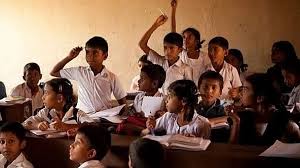

UP Govt Launches Astro Labs in Government Schools to Boost Scientific Learning
-
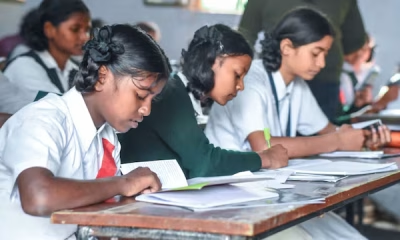

Class 3 Learning Levels Show Gains Since Pandemic, But Still Below 2017: PARAKH Survey
-


Manipur Rallies Call for Disruption-Free Education Amid Ongoing Unrest
-
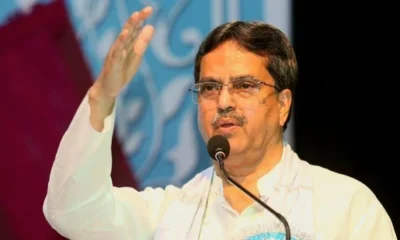

Tripura CM Launches School Framework, Stresses Social Work in Education
-
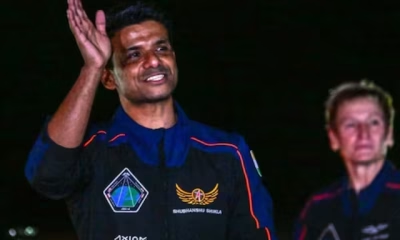

“We Sleep on Walls Here”: Shubhanshu Shukla Talks to Indian Students from Space
-


A Structural Proposal to Transform School Education in Bihar
-
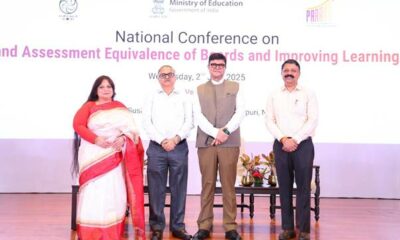

National Conference Pushes for Common Standards Across School Boards
-
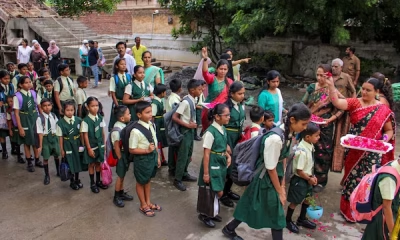

Maharashtra: Over 8,000 Villages Lack Schools, CCTV Compliance Still Patchy
-
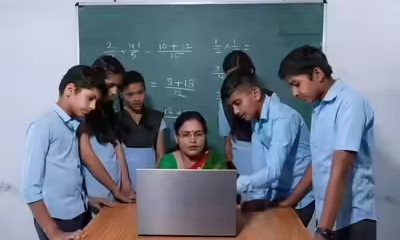

Haryana to Offer Free After-School Coaching for JEE, NDA Aspirants
-
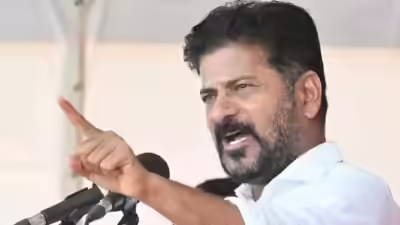

Telangana CM Calls for Overhaul of Intermediate Education in Telangana
Education
UP Govt Launches Astro Labs in Government Schools to Boost Scientific Learning
Published
23 hours agoon
July 8, 2025
Under the leadership of Chief Minister Yogi Adityanath, the state is rolling out astro labs in government schools at the block level, aiming to strengthen scientific thinking and curiosity among school children, especially in rural areas.
According to a statement issued by the government, these labs—named Amrit Kaal Learning Centres—are being developed through a public-private partnership (PPP) model and are already operational in several districts.
The initiative is designed to give students access to real-time, hands-on learning experiences using tools like Dobsonian telescopes, VR headsets, microscopes, light experiment kits, and anatomical models. These tools go beyond textbook learning, allowing students to explore astronomy, gravity, light, and the physical world through direct experimentation.
Officials say the initiative has already made significant impact. In Ballia district, for example, science labs have been established in all 17 blocks to make science more engaging and inquiry-driven.
Ballia District Magistrate Mangla Prasad Singh said the labs are aligned with the state’s broader goal of making science accessible and meaningful. “These labs are designed to foster experiential and inquiry-based learning,” he noted.
Chief Development Officer Aojaswi Raj added that each lab costs between ₹2.5 to ₹3 lakh, including both the equipment and teacher training. The inclusion of orientation sessions, video guides, and mentorship support for teachers ensures that the labs are used effectively in classrooms.
“These labs have sparked genuine curiosity among children, who now ask questions, observe the night sky, and explore concepts far beyond the standard curriculum,” said Raj.
The program is part of a larger effort to bridge the gap between urban and rural education. With access to advanced tools and teacher support, children in villages are beginning to imagine careers in space science, inspired by stories like that of Indian-origin astronaut Shubhanshu Shukla.
The UP government hopes this initiative will help build a future-ready generation, where aspiration is not defined by geography, and the boundaries of scientific exploration begin right from the classroom.
Education
Class 3 Learning Levels Show Gains Since Pandemic, But Still Below 2017: PARAKH Survey
Published
23 hours agoon
July 8, 2025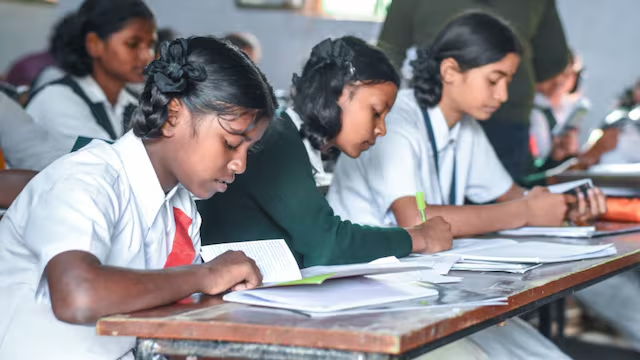
According to the government’s latest PARAKH Rashtriya Sarvekshan report released on Monday, Class 3 students across India have yet to return to pre-COVID academic levels. The survey, conducted in December 2024, covered more than 21 lakh students from Classes 3, 6, and 9 across 74,229 schools, offering a large-scale snapshot of student learning recovery after the pandemic.
Among the three grades, Class 3 is the only one surveyed in all three rounds (2017, 2021, and 2024) — allowing for direct comparison. While there has been an uptick in scores since the 2021 assessment, they remain below the national average recorded in 2017.
In 2024, Class 3 students scored an average of 64% in language, compared to 62% in 2021 — but still lower than 66.7% in 2017. In Mathematics, the score stood at 60%, up from 57% in 2021, but below the 63% recorded in 2017.
Students were found to struggle the most in reading short stories and understanding them (60%), while performing best in everyday language usage (67%). In Maths, the lowest scores came in geometry and money concepts (50%), with the strongest performance in identifying basic shapes and number patterns (69%).
The survey’s structure is aligned with the National Education Policy (NEP) 2020, which breaks school education into four key stages. Class 3 marks the end of the Foundational Stage, making it a crucial checkpoint for basic literacy and numeracy.
Classes 6 and 9: Scores Below 50% in Most Subjects
Students in Classes 6 and 9 showed average scores below 50% in all subjects except language, suggesting that older cohorts may be bearing the brunt of prolonged learning loss from pandemic-related school closures.
A senior official from the Ministry of Education noted that these grades missed nearly two full years of classroom instruction during a critical developmental period. Despite visible recovery since 2021, the learning gaps persist.
Why This Matters
The findings serve as a reminder of the lasting impact of the pandemic on India’s school education, especially for early learners. The report calls for targeted learning interventions, curriculum adjustments, and robust teacher support systems to help students recover foundational skills.
With only limited time before students transition into higher stages of schooling, the emphasis is now on accelerated catch-up strategies and deeper diagnostic assessments to address these persistent gaps.
Education
Design and the Future of Learning: How Architecture is Shaping Next-Gen Schools
Published
24 hours agoon
July 8, 2025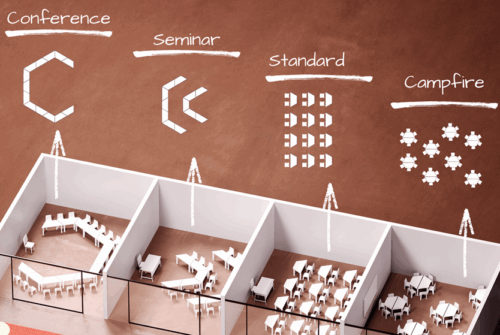
Schools Undergoing Change in India
Schools in India are undergoing a major transformation. Teaching methods are evolving, and schools must meet rising expectations from students, parents, and educators. The National Education Policy (NEP) 2020 has introduced a fresh approach to learning, making it essential for new schools to be designed with these ideas in mind. Older campuses also need thoughtful upgrades and renovations to keep pace.
Schools must adapt to stay relevant in the years ahead. Designing flexible, future-ready spaces is no longer optional, it is vital for creating learning environments that will serve new generations for decades to come.
Experiential Learning
Experiential learning is reshaping education by focusing on hands-on, experience-based learning. It encourages students to take part in activities, real-world problem-solving, and interactive projects that spark curiosity and innovation. Collaboration is central — students work together to tackle challenges, share ideas, and find solutions. This approach deepens understanding and builds teamwork and communication skills needed for future work.
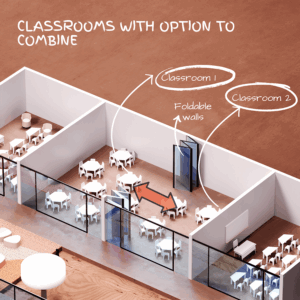
The Importance of Collaboration
Creating spaces that foster experiential learning, enhance engagement, and build critical thinking is essential. Collaborative spaces are a core part of modern school design. They encourage active learning and help students grasp concepts in a deep and meaningful way. By fostering collaboration, schools enable students to develop the skills necessary for success in a rapidly changing world.
Evolving Traditional Classrooms
Traditional classrooms are changing fast. The old rows of desks facing the teacher are giving way to flexible layouts that support different ways of learning. Today’s classrooms can easily switch between standard seating for lectures, conference-style setups for group work, seminar formats for presentations, or campfire circles for open discussions.
Good spatial design plays a big role in building critical thinking and problem-solving skills. A well-designed classroom makes it easy to rearrange furniture for each activity, helping students engage more, think creatively, and learn better together. Studies show students are more motivated and focused in classrooms that adapt to different teaching styles and make learning more interactive.
Spatial Design to Encourage Collaboration
Classrooms with movable furniture allow easy reconfiguration for group work, individual study, or interactive discussions. Flexibility is crucial in modern school design, with modular furniture, movable walls, and multipurpose rooms adapting to different needs. Removing long corridors and creating learning commons with classrooms around them is another innovative approach. Classrooms can open into these commons using sliding or folding partitions, creating a cohesive learning environment. Combining classrooms allows teachers to teach multiple groups together,
building a sense of community.
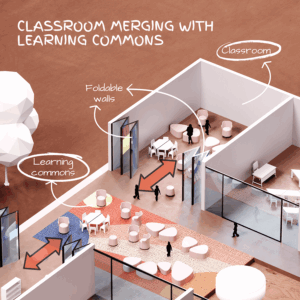
Breakout spaces offer small areas for group discussions, brainstorming, or quiet study, with comfortable seating and whiteboards. Makerspaces equipped with tools and materials foster innovation and hands-on learning by allowing students to apply theory in practice. Outdoor learning areas like gardens or amphitheaters add variety and encourage creativity. Technology-integrated spaces with interactive whiteboards and projectors enhance collaboration by making it easy for students to work together and share ideas. Learning pods provide semi-private spots for group work or individual study. Transparent walls and large windows create openness and bring in natural light, inspiring students to stay engaged.
Designing for well-being & Inclusion
Natural light, vibrant colours, and good acoustics make learning spaces more engaging. Inclusivity is essential so that diverse needs and abilities are accommodated, ensuring all students can succeed. Cross ventilation, thermal comfort, and indoor air quality are equally important — they improve physical comfort and well-being, helping students focus better.
Creativity is also key in effective learning spaces. From preschools to K-12, classrooms should inspire imagination and encourage students to think beyond the ordinary. Thoughtful design elements help create environments where curiosity and innovation thrive.

Conclusion
The future of learning will continue to evolve, but well-designed spaces will always play a central role. As educators and designers, we have a unique responsibility to create environments that inspire curiosity, spark ideas, and
support every learner’s journey. By designing schools that are flexible, inclusive, and future-ready, we build not just better classrooms but a stronger foundation for generations to come.
This article is authored by Vinod and Ranju Singhi, the Co-Founders and Principal Architects of BASICS Architects.
Education
Punjab to Introduce Business, Marketing Education in Govt Schools for High Schoolers
Published
2 days agoon
July 7, 2025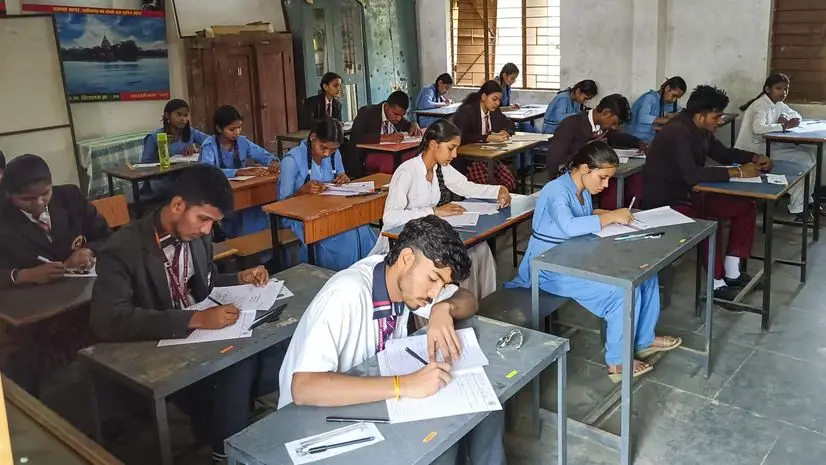
The Punjab government has announced that all Class 11 and 12 students in government schools will receive skill education in business and marketing from the upcoming academic session. The initiative is being implemented under the Punjab Young Entrepreneurs Scheme.
According to Education Minister Harjot Singh Bains, the programme aims to introduce basic entrepreneurship concepts to senior secondary students. As part of this, students will be required to develop and present business ideas as subject-linked projects. The state has also invested in setting up innovation labs in schools to support product development and technical training.
The initiative was formally presented at the Business Blasters Expo 2025, where student teams from various districts showcased business models to a panel of educators, industrialists, and startup professionals. According to official information, participating teams received financial support to take their ideas forward.
Some of the student-led projects included products such as handmade goods, natural cosmetics, customised simulators, framed artwork, and cycle-based mobility solutions. In one case, a student from Mullanpur Dakha created decorative items that were later sold in the market at a significantly higher margin.
The Education Minister also cited employment data between 2014–15 and 2021–22, pointing to a gap between job applicants and job placements. The scheme, he said, is being introduced with the aim of equipping students with skills relevant to today’s economic landscape.
Initially piloted in 30 schools, the Punjab Young Entrepreneurs Scheme is now being scaled across the state. The business and marketing module is expected to cover financial literacy, product development, market analysis, and customer outreach.
The government has stated that the curriculum will align with academic requirements while also supporting practical exposure. Further partnerships with technical institutions and industry stakeholders are also being explored.
Education
Manipur Rallies Call for Disruption-Free Education Amid Ongoing Unrest
Published
2 days agoon
July 7, 2025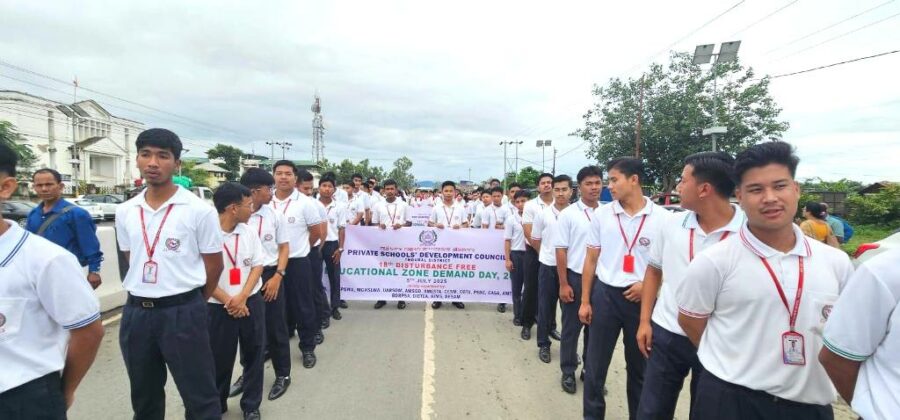
Thousands of voices echoed across the valley districts of Manipur on 5th July, as students, teachers, and civil society members marched in unison, demanding an uninterrupted and safe educational environment. Marking the 18th Disturbance-Free Education Zone Demand Day, the rallies were spearheaded by the Democratic Students’ Alliance of Manipur (DESAM), with support from over 15 civil society organisations.
Held across Imphal East, Imphal West, Kakching, Thoubal, and Bishnupur, the rallies were unified under the message: “Make Education a Disturbance Free Zone.” From THAU Ground near the Legislative Assembly to Imphal College, and similar routes in other districts, demonstrators walked with banners, placards, and resolute slogans calling for peace and protection of learning spaces.
This year’s observance comes at a particularly sensitive moment for the state, as Manipur continues to reel from over two years of ethnic conflict, political instability, and administrative disruptions. These challenges have had a disproportionate impact on the state’s education system—schools in conflict zones have been intermittently closed, exams postponed, and many children displaced from both their homes and classrooms.
Speaking to the media during the rally, DESAM President Mayengbam Somorjit urged the government to pass legislation mandating a minimum of 220 academic days per year, to ensure stability and learning continuity even during crises. He emphasized that children in Manipur must not be deprived of their right to education because of circumstances beyond their control.
Other demands included the appointment of Directors of Education from among experienced educators, and greater transparency in recruitment and promotion processes within the education department. There were also strong appeals to armed groups to abstain from placing financial or material demands on educational institutions—a practice that has led to school closures and security concerns in the past.
The rallies were largely peaceful and drew significant participation from both urban and rural communities. Protesters stressed that beyond political resolution, restoring education must become a humanitarian priority.
In the past two years, students in conflict-affected districts have faced regular school closures, sporadic internet blackouts, and mental health challenges, as families grapple with violence, displacement, and uncertainty. NGOs and local educators have warned of rising dropout rates, learning loss, and a deepening digital divide—especially in remote or vulnerable communities.
While the larger political crisis in Manipur continues to seek resolution, the message from students and educators is clear: education must be safeguarded. As one banner read during the march: “Books, not bullets. Peace, not pauses.”
Education
Tripura CM Launches School Framework, Stresses Social Work in Education
Published
2 days agoon
July 7, 2025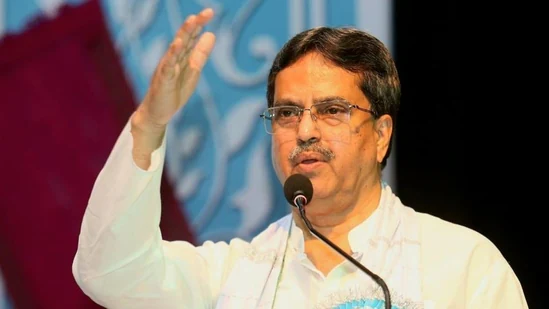
Tripura Chief Minister Dr. Manik Saha on Friday launched the ‘Tripura School Quality Assessment and Accreditation Framework (TSQAAF),’ a state-level mechanism aimed at standardising and evaluating school performance to align with national quality benchmarks.
Speaking at the launch event at Rabindra Shatabarshiki Bhavan in Agartala, Dr. Saha, who also holds the Education portfolio, emphasised that while academic knowledge is essential, it must be accompanied by values, social awareness, and holistic development.
“Textbook education can never be the standard of life,” the Chief Minister stated, adding, “Along with education, children should also be engaged in social work.”
The TSQAAF is expected to serve as an evaluative framework that not only sets indicators for school infrastructure, teaching practices, and learning outcomes but also focuses on co-curricular and value-based education. According to officials, the framework will allow schools across Tripura to be assessed, accredited, and guided for improvement on measurable parameters of quality.
Saha acknowledged that the state education department is adapting to the evolving needs of learners and aligning with national initiatives like the National Education Policy (NEP) 2020. He highlighted the importance of uniformity in curriculum and assessment to ensure students across India are prepared for central-level competition.
“If there is a uniform question paper, our children can also compete centrally,” he said.
The CM also spoke about the broader responsibilities of teachers in shaping character, ethics, and social consciousness among students. He encouraged the inclusion of practical subjects that address social problems and life skills, going beyond syllabus-bound instruction.
Reaffirming the state’s commitment to education reforms, Saha said quality teachers are being recruited through the Teacher Eligibility Test (TET), and more appointments are planned to strengthen the system further.
Senior officials, including Special Secretary of the Education Department Raval Hemendra Kumar, Director of Education N C Sharma, and SBI Foundation CEO Sanjay Prakash, were present at the event. The SBI Foundation has also extended support to the state’s education initiatives.
The TSQAAF initiative marks another step in Tripura’s education reform roadmap, aimed at creating a comprehensive schooling environment that prepares students for academic success while also cultivating civic responsibility.
Education
“We Sleep on Walls Here”: Shubhanshu Shukla Talks to Indian Students from Space
Published
5 days agoon
July 4, 2025
Astronaut Shubhanshu Shukla, currently stationed aboard the International Space Station (ISS), answered questions from schoolchildren during a live interaction hosted under ISRO’s Vidyarthi Samvad Program.
The session, designed to bring students closer to the realities of space science, turned into a heartwarming and humorous conversation about food, sleep, and the sheer wonder of viewing Earth from space.
When asked how astronauts sleep in zero gravity, Shukla smiled and explained: “There is no floor or ceiling in space. Some of us sleep on the wall, some on the ceiling. We have to tie ourselves down so we don’t float away while sleeping.”
The conversation became sweeter when Shukla revealed that he brought familiar Indian flavours with him into orbit. “I have carried gajar ka halwa, moong dal halwa, and mango juice with me from India,” he said, to the delight of the young audience. He clarified that the halwa was specially medicated for space missions, not made at home — a detail that sparked laughter and curiosity alike.
The astronaut also spoke about daily life aboard the ISS, including how exercise is essential to counter microgravity. “We ride bicycles here, but there are no seats. We strap ourselves in with belts,” he told the children, who were both fascinated and amused by the image.
For Shukla, however, the highlight of being in space remains the view of Earth. “That blue sphere, that light mist… seeing Earth from here is the most beautiful experience. It’s hard to describe in words.”
Addressing mental well-being, he shared how astronauts stay connected with their families. “Technology helps bridge the distance. We can talk to our loved ones, and that keeps us grounded — even when we’re not.”
Also present during the interaction was Group Captain Angad Pratap, a fellow member of the Gaganyaan mission crew, who encouraged students to consider careers in aviation and space science.
For many students, the session was a dream come true. “It felt like science fiction,” said one participant. “Now I believe I can go to space one day.”
As India continues its rapid progress in space exploration, conversations like these serve as reminders that inspiration is as critical as infrastructure — and that sometimes, a simple chat with an astronaut can launch the imagination of an entire generation.
Education
A Structural Proposal to Transform School Education in Bihar
Published
5 days agoon
July 4, 2025
In a recent public interaction, political campaigner and policy strategist Prashant Kishor detailed a long-term education plan aimed at overhauling Bihar’s school system. Emphasizing structural change over symbolic efforts, Kishor’s proposal focuses on centralized excellence, increased parental choice, and a phased financial roadmap over a 10-year period.
At the heart of the model lies a shift from quantity to quality. Rather than building one school in every village, the plan envisions five world-class government schools per administrative block, inspired by the legacy of the prestigious Netarhat Vidyalaya. These institutions would be open to students from all socioeconomic backgrounds, with Kishor stating that school buses and transport access would ensure that no child travels more than 20 minutes to reach school.
For families dissatisfied with local government schools, the model introduces an alternative: state-funded access to private education. If a student opts for a regulated private school nearby, the government would bear the cost. According to Kishor, this mirrors global best practices and provides an immediate quality option while public school infrastructure is being upgraded.
Contrary to the common belief that government education is cost-free, Kishor highlighted that Bihar currently spends an average of ₹850 per month per child in public primary schools. In comparison, many private institutions operate at a lower cost. “It’s not about public versus private. It’s about outcomes and value,” he stated.
The financing strategy involves a three-part allocation of the current education budget:
-
Building new elite schools (500 per year; 5,000 in 10 years)
-
Improving existing government schools
-
Funding private education for low-income students where needed
The total projected investment over a decade is ₹1 lakh crore.
The proposal has triggered a wider conversation around efficiency, equity, and the future direction of school education in under-resourced states. While it has been shared in a pre-election context, the structural detail and comparative lens make it notable for educationists and policymakers nationwide.
As the national education landscape continues to evolve post-NEP 2020, Bihar’s unfolding discourse offers a compelling case study on scalable, outcome-driven reform.
Education
NIIT Foundation and YuWaah, UNICEF Launch Free Online Digital Marketing Course for Youth
Published
5 days agoon
July 4, 2025
In a bid to support youth skilling in India, NIIT Foundation and YuWaah (a UNICEF India initiative) have jointly launched an Open Online Course in Digital Marketing as part of their #NayiDigitalDisha campaign.
The initiative has been rolled out in Rajasthan, Jharkhand, and Odisha and aims to reach 500 participants. The 8-week online program has been structured to be accessible to learners from underserved and remote areas. Upon completion, students will receive a credential assessed by NCVET and certified by NSDC.
The curriculum focuses on practical digital marketing skills including social media strategy, online customer sourcing, and campaign execution. Course development was led by NIIT Foundation, drawing on industry consultation and its prior experience in skill training.
According to the organisers, the goal is to provide industry-aligned learning opportunities to help learners secure employment and enhance their readiness for digital roles. Participants will receive certifications from both NIIT Foundation and YuWaah, UNICEF.
The program’s implementation coincides with India’s broader push towards a skilled workforce, aligning with national goals to build digital and job-readiness capacity by 2047. The digital learning initiative is part of a larger ecosystem supported by YuWaah that includes career guidance, leadership opportunities, and pathways to socio-economic participation for young people.
Earlier success stories, such as a student securing job placements after course completion, indicate emerging results; however, the course’s full impact is yet to be assessed as it progresses through its first implementation cycle.
Education
National Conference Pushes for Common Standards Across School Boards
Published
5 days agoon
July 4, 2025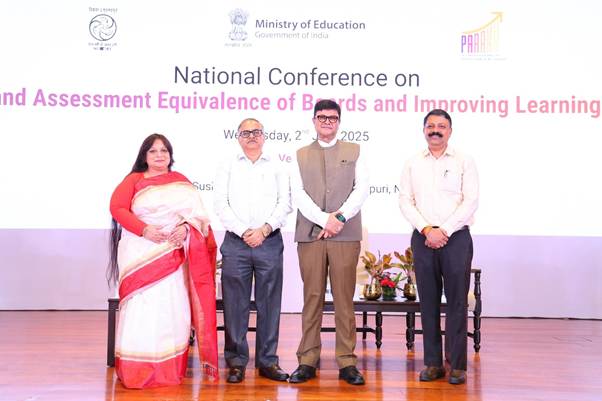
In a move set to impact India’s school education ecosystem, the Department of School Education and Literacy (DoSE&L), Ministry of Education, convened a high-level National Conference on Curricular and Assessment Equivalence of Boards and Improving Learning Outcomes at Sushma Swaraj Bhawan, New Delhi.
With over 250 senior officials from education departments, boards, SCERTs, and autonomous bodies like CBSE, KVS, and NVS, the conference reflected a coordinated push to align learning outcomes and assessment standards across India’s diverse schooling systems.
Chaired by DoSE&L Secretary Sanjay Kumar, the sessions explored how India can move toward competency-based education while ensuring fairness and flexibility for States/UTs. He emphasised that equivalence in curriculum and assessments is essential as India modernises its academic benchmarks in line with NEP 2020.
A key highlight was the launch of the PARAKH Rashtriya Sarvekshan Dissemination Portal, giving open access to national and state-wise data on student performance. The tool is designed to help States/UTs craft targeted improvement plans.
Prof. Indrani Bhaduri, CEO of PARAKH, also unveiled the findings from the 2024 National Survey, highlighting district-wise variations and prompting calls for data-driven, localised reform.
Best practices from six States/UTs — including Kerala, Punjab, UP, and Maharashtra — offered a practical lens on how systemic innovations can drive classroom-level change.
The conference also delved into board equivalence frameworks, with seven State Boards — including Andhra Pradesh, Assam, Goa, and J&K — presenting models for alignment of curricula, assessments, and evaluation standards.
CBSE Chairperson Rahul Singh spoke on school quality assurance, urging emphasis on self-evaluation and data transparency.
The conference spotlighted the School Quality Assessment and Assurance Framework (SQAAF) and called for the establishment of State School Standards Authorities (SSSA) in every State/UT.
Further, the session on vocational education equivalence underscored the importance of recognising school boards as vocational awarding bodies — a step towards seamless academic–skill integration and lifelong learning.
Ready Reckoner videos, Holistic Progress Cards (HPCs), and tools for continuous, child-centric evaluation were also introduced, aimed at embedding NEP’s vision in day-to-day school practice.
The event concluded with a collective reaffirmation: building an equitable, high-quality education system will require collaborative governance and commitment to learning for all.
Newsletter

UP Govt Launches Astro Labs in Government Schools to Boost Scientific Learning

Class 3 Learning Levels Show Gains Since Pandemic, But Still Below 2017: PARAKH Survey

Design and the Future of Learning: How Architecture is Shaping Next-Gen Schools

Punjab to Introduce Business, Marketing Education in Govt Schools for High Schoolers

Manipur Rallies Call for Disruption-Free Education Amid Ongoing Unrest

Tripura CM Launches School Framework, Stresses Social Work in Education

“We Sleep on Walls Here”: Shubhanshu Shukla Talks to Indian Students from Space

A Structural Proposal to Transform School Education in Bihar

NIIT Foundation and YuWaah, UNICEF Launch Free Online Digital Marketing Course for Youth

National Conference Pushes for Common Standards Across School Boards

Maharashtra: Over 8,000 Villages Lack Schools, CCTV Compliance Still Patchy

Haryana to Offer Free After-School Coaching for JEE, NDA Aspirants

Telangana CM Calls for Overhaul of Intermediate Education in Telangana

Indian Astronaut Shubhanshu Shukla to Connect with School Students Live from Space

Are 4-Year Degrees Dead? Nikhil Kamath and the WEF Say Lifelong Learning Is Here to Stay

UGC Cracks Down on 89 Institutes Over Anti-Ragging Failures

Government Doubles Down on Coaching Centres: New Panel Signals Stronger Regulation Ahead

CBSE To Conduct Board Exams Twice for Class 10 from 2026

How to Win Back Wandering Minds: Post-Summer Edition
Tripura Becomes Third Indian State to Achieve Full Literacy

Assam Brings Sign Language to Senior Secondary Classrooms in Landmark Move

Delhi Schools to Implement Age 6 Rule for Class 1 Admissions from 2026

Tripura Adds Sex Education & HIV Awareness to Their Curriculum

Four Indian Schools Shine on the Global Stage at World’s Best School Prizes 2024

Centre Urges 7 States to Consider Common Board Amid Alarming Student Failure Rates

Is Your School Following These Mandatory CBSE Committees?

CBSE’s ‘Sugar Boards’ Initiative: Tackling the Sweet Crisis in Indian Schools

Maharashtra to Regulate Pre-Primary Education with New Law Aligned to NEP 2020

MAHAJYOTI’s Book Distribution Scheme to Empower 7,000 OBC Students Preparing for JEE/NEET & MHT-CET

China Embarks on Ambitious AI-Driven Education Reform to Build a ‘Strong Education Nation’ by 2035

John King’s Book ‘Teacher By Teacher’: A Global Tribute to the Transformative Power of Education

CBSE Introduces Mandatory Bridge Course for Classes 6 to 12 in Chhattisgarh Under NEP 2020

Rewriting Ambedkar: Why Students Must Know the Man Beyond the Constitution

CBSE Mandates 50-Hour Annual Training for Teachers, Declares STEM as 2025 Theme

Banu Mushtaq’s International Booker Win Is a Wake-Up Call for Indian Schools to Reclaim Literature

India Bids Farewell to NEP Architect Dr K. Kasturirangan

Pradhan Mantri Rashtriya Bal Puraskar 2025: Nominations Now Open for India’s Young Achievers

NCERT Class 7 Textbooks Updated: Mughals Removed, Focus on Indian Ethos and Pilgrimage

Delhi Government Cracks Down on Dummy Schooling; Over 600 Schools Inspected, 10 Issued Notices

Delhi Approves Landmark Bill to Regulate School Fees Across 1,677 Institutions

Operation Sindoor and Operation Abhyaas: Navigating School Safety and Student Well-being Amid Rising Tensions

Harvard Stands Its Ground: Harvard Faces ₹18,400 Crore Funding Freeze After Rejecting Trump Administration’s Demands
CBSE Revises Class 10, 12 Curriculum: Biannual Exams, New Subjects and Flexible Passing Criteria Introduced

CUET-UG 2025 Likely to be Postponed, Fresh Dates Expected Soon

Aalamaram 2025: Where Indian Educators Came Together to Grow, Reflect, and Lead

Trump Signs Executive Order to Promote AI Integration in U.S. K-12 Education

Mizoram Declared First Fully Literate State in India

Indian Students Flock to Singapore, Ireland, and Dubai for Higher Studies: 38% Surge Recorded

UK’s New Immigration Rules: What They Mean for Indian Students

OpenAI Academy Launches in India to Democratise AI Education for Students, Teachers, and Startups
SGEF2023 | Special Address by Rama Datt, Trustee, Maharaja Sawai Man Singh II Trust, Jaipur

ScooNews | After Movie | ScooNews Global Educators Fest 2023

Aftermovie | NIES2 UP Chapter | 21 Jan 2023

WEBINAR | Gamification in Education: How Digital Badges Can Boost Student Motivation and Engagement

ScooNews | WEBINAR| Importance of Physical Activity for Children at School | Plaeto

SCOONEWS | WEBINAR | WHY DIGITIZING YOUR SCHOOL IS A MUST | TEACHMINT

Keynote Address | Lakshyaraj Singh Mewar

Anurag Tripathi, Secretary, CBSE at SGEF2022

How schools can nurture every student’s genius

Aftermovie | SGEF2022 | Jaipur

Li Andersson | Minister of Education | Finland

Anurag Tripathi, Secretary, Central Board of Secondary Education (CBSE) discusses NEP2020

ScooNews | Early Ed Asia 2019 | Aftermovie
#PodarECEconf : Pursuing quality ECE

#CBSE Class XII #Results #Highlights

The interesting story of India’s educational system | Adhitya Iyer

A young scientist’s quest for clean water

The Danger of Silence: Clint Smith

National Digital Library of India is an initiative by HRD Ministry

Remembering Kalpana Chawla on her birthday!

Message from Sadhguru for Students!
Message from Sadhguru for Students!

The Untapped Genius That Could Change Science for the Better

Eddy Zhong: How school makes kids less intelligent TEDxYouth@Beacon

#TEDxCanberra : What if every child had access to music education…
Trending
-
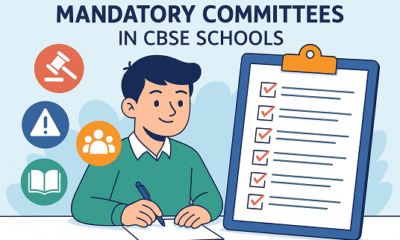
 Education3 months ago
Education3 months agoIs Your School Following These Mandatory CBSE Committees?
-

 Education2 months ago
Education2 months agoCBSE’s ‘Sugar Boards’ Initiative: Tackling the Sweet Crisis in Indian Schools
-
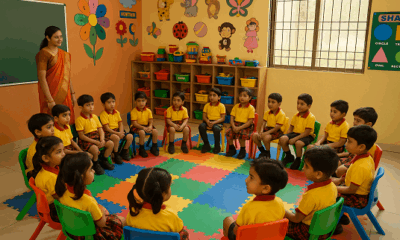
 Education3 months ago
Education3 months agoMaharashtra to Regulate Pre-Primary Education with New Law Aligned to NEP 2020
-
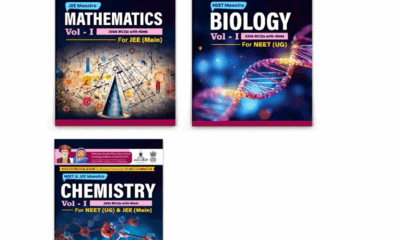
 Education3 months ago
Education3 months agoMAHAJYOTI’s Book Distribution Scheme to Empower 7,000 OBC Students Preparing for JEE/NEET & MHT-CET
-
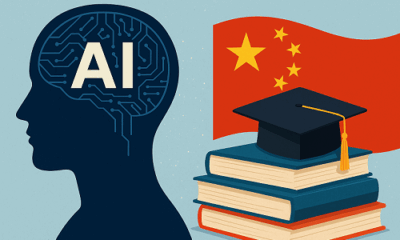
 Education3 months ago
Education3 months agoChina Embarks on Ambitious AI-Driven Education Reform to Build a ‘Strong Education Nation’ by 2035
-
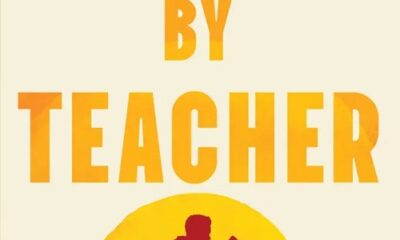
 Education2 months ago
Education2 months agoJohn King’s Book ‘Teacher By Teacher’: A Global Tribute to the Transformative Power of Education
-
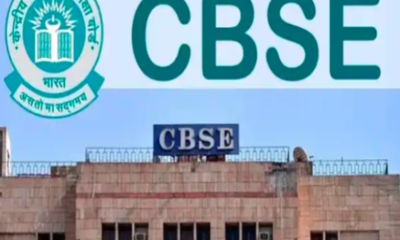
 Education3 months ago
Education3 months agoCBSE Introduces Mandatory Bridge Course for Classes 6 to 12 in Chhattisgarh Under NEP 2020
-
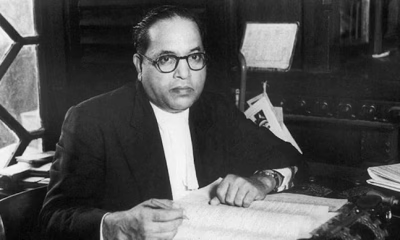
 Education3 months ago
Education3 months agoRewriting Ambedkar: Why Students Must Know the Man Beyond the Constitution
-
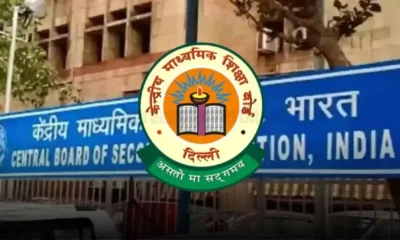
 Education3 months ago
Education3 months agoCBSE Mandates 50-Hour Annual Training for Teachers, Declares STEM as 2025 Theme
-
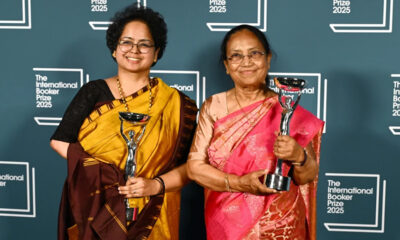
 Education2 months ago
Education2 months agoBanu Mushtaq’s International Booker Win Is a Wake-Up Call for Indian Schools to Reclaim Literature





